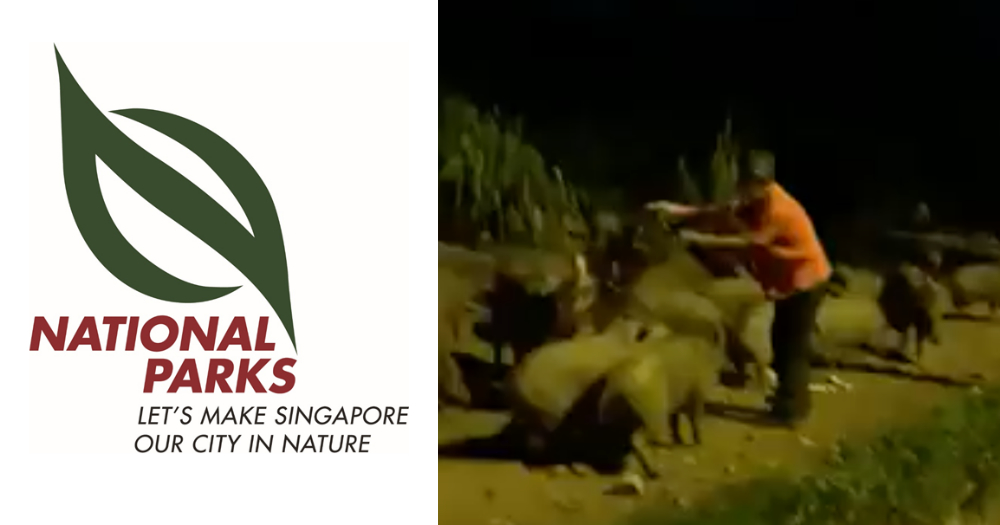Editor's note on April 21: The article has been updated for clarity, NParks informed Mothership that the nine individuals have been fined for flouting the Circuit Breaker measures.
A circulating video showed some men feeding a large sounder of wild boars at Lorong Halus in the middle of the night recently.
In response, the National Parks Board (NParks) said that it is aware of the incident.
9 people charged for feeding or watching wild boars
According to the group director of the wildlife management department at NParks, Adrian Loo, NParks officers have conducted operations over the weekend at Lorong Halus and caught nine people who were believed to be feeding or watching the wild boars, including the men captured in the widely-circulated video.
The other six were caught on separate occasions during the same operation, according to Loo.
The nine individuals will be fined for breaching measures under the Covid-19 (Temporary Measures) Act for carrying out non-essential activities or gathering at the site despite being from different households, the statement added.
NParks also advises members of the public to stay at home to minimise the risk of Covid-19 spread, and to go out only for essential activities.
This is aligned with the advisories by the Ministry of Health (MOH).
Adverse effects of feeding wildlife
NParks advised members of the public to not feed wild animals as human feeding can alter the natural behaviour of the wildlife and make them reliant on humans for food.
When the wild animals associate humans as food providers, they will have an increased propensity to approach humans.
This may lead to them displaying aggressive behaviour towards people, venturing into urban areas in search of human sources of food and wandering onto roads, posing a potential danger to motorists and the animals themselves.
Human feeding might seem to be an act of kindness but it might not always be beneficial for the animals. Feeding wildlife with processed foods like bread can cause health problems as the food is not suitable for them, Loo cautioned in the statement.
Wildlife may also lose their natural foraging skills and struggle to survive in their natural environment when there is no readily available food source.
Loo also explained that many wild animals fulfil ecological roles such as pollinators and seed dispersers, and these processes may be disrupted when they rely on humans for food instead.
The population and distribution of wildlife are regulated through the resources available in the natural environment.
Feeding causes an artificial increase in food which may result in an unnatural and unsustainable increase in populations.
This action contributes to increased human-wildlife conflict and also upsets the ecological balance.
Wildlife feeding to be made illegal in 2020
In the interest of both humans and wildlife, amendments to the Wild Animals and Birds Act were passed by Parliament on March 25.
This new Wildlife Act, which is expected to take effect later this year, will enable NParks to take action against the feeding of wildlife without the Director-General’s approval.
First-time offenders caught feeding wildlife could be fined up to S$5,000, and repeat offenders could be fined up to S$10,000.
Top photo via NParks Facebook and Teoh Chee Boon’s Facebook video.
If you like what you read, follow us on Facebook, Instagram, Twitter and Telegram to get the latest updates.
